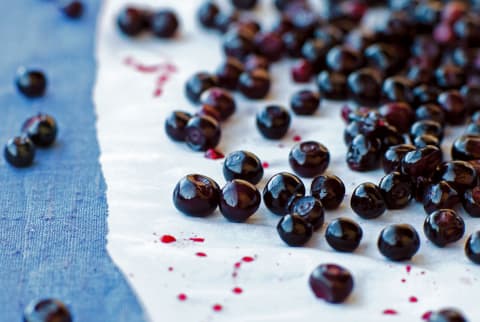Advertisement
Elderberry Tinctures: 5 Perks Of The Immune-Supporting Supplement


Immune health has been a popular topic these last couple of years. And as we enter into the colder months, it becomes even more important to make sure you're giving your body the support it needs.
While a healthy diet, regular movement, and stress management are the foundations of well-being, certain herbal supplements, like elderberry tinctures, can help fill in the gaps.
What is an elderberry tincture?
A tincture is a highly concentrated herbal extract that's made by soaking plant materials—in this case, elderberries—in alcohol or glycerin for an extended period of time, usually at least six weeks. The alcohol helps pull the nutritional components out of the berries and disperses them into a liquid that's easy to incorporate into your day. Elderberry tinctures can be dropped right in your mouth or added to your water or a smoothie for easy sipping.
There are also elderberry syrups. These are made in a similar way, but syrups are usually thicker and typically contain added sugars, which you want to avoid as much as possible. Both tinctures and syrup are sold as supplements.
Elderberry tincture benefits
Elderberry is a widely regarded botanical for its ability to support the immune system, but the benefits go beyond that, too. Here are just a few possible perks of elderberry:
Immune support
Perhaps the most well-known benefit of elderberry is its intrinsic antibacterial and antiviral properties1. Integrative medicine doctor Alejandra Carrasco, M.D., once told mbg that liquid extract from the berry has been shown to limit activity against bad bacteria and support overall immune resilience.
"In general, elderberries are an excellent source of antioxidants, which help to maintain a strong immune system," functional medicine doctor Tiffany Lester, M.D., previously said.
Rich in nutrients and antioxidants
Elderberries are also a nutritional powerhouse, containing a wide variety of nutrients, including vitamins A, C, E, K, and B's, and calcium, potassium, and magnesium. "Elderberries [also] contain flavonoids, proanthocyanidins, anthocyanins, and phenolic acids, which buffer against the oxidative stress caused by reactive oxygen species (ROS)," Carrasco says.
Support our insulin response
Thanks to the phytochemicals, specifically flavonols, flavanols, phenolic acids, proanthocyanidins, and anthocyanins, elderberry tinctures may help promote insulin sensitivity2 (and therefore, support blood sugar balance) and other metabolic functions.
Deliver anti-inflammatory properties
Elderberry is rich in anthocyanins3, which help support a normal inflammatory response4. And as mbg's former director of scientific affairs Ashley Jordan Ferira, Ph.D., RDN, once told us: A healthy inflammatory response is an essential component of metabolic health and immunity, which go hand-in-hand.
Elderberry tincture dosage
There's no single elderberry tincture dosage that's appropriate for everyone. That being said, recommended dosages typically fall between 650 and 1,500 milligrams per day5. But you should always follow your doctor's instructions on how much elderberry you should take.
Elderberry tincture recipe
If you have access to fresh elderberries, you can make your own tincture with just two ingredients, but you have to make sure you're going about it the right way. "The [raw] bark, leaves, and root of the elderberry plants contain sambunigrin, which can release cyanide," Carrasco previously told mbg. "If you are making your own syrup, make sure that you thoroughly cook the berries."
Here's how to do it:
- Add a cup or two of fresh berries to a small saucepan. Stir over low heat for 15 minutes, gently crushing the berries as they cook.
- Transfer cooked berries to a Mason (or other airtight) jar and fill the jar almost to the top with a vodka that's at least 80 proof—you can leave about an inch of empty space.
- Gently stir to release air bubbles and cover tightly.
- Store in a dark, cool place for at least 4 to 6 weeks.
- Strain and reserve the liquid (preferably in a dark, airtight bottle), and discard the solids.
- Store in a dark place away from sunlight.
One more important note: If you are collecting your own berries, make sure you're properly identifying them. (It's black elderberries you want!)
If you're not the DIY type, there are plenty of high-quality tinctures you can buy instead. Just make sure to avoid any that have added sugars or other undesirable ingredients. As a general rule, anything marketed as a "syrup" likely contains sugar in some form, while tinctures or drops are usually sugar-free. Just make sure to read the ingredient lists and double-check that you're getting what you want.
The takeaway
Elderberry tinctures are highly concentrated liquid extracts that are rich in all the nutrients (vitamins, minerals, and antioxidants) that are naturally found in the berries. These tinctures make it easy to take elderberries every day since you only need a small amount to reap the benefits. While you can make your own, there are also plenty of high-quality tinctures available for purchase. Make sure you check in with your doctor and get the green light before adding elderberry to your routine, though.

















